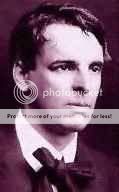Poetry Wednesday 11/26/08: William Butler Yeats
 The Bridges of Madison County.
The Bridges of Madison County.
This week for Poetry Wednesday, I will present this story from the perspective of the novel, which the movie originated from. There is more detail in the novel that was overlooked in the film, such as several references to poetry that I felt contribute to the beauty of the story.
The Bridges of Madison County is a best-selling novel by Robert James Waller which tells the story of a lonely Italian war bride who engages in an adulterous affair with a National Geographic photographer from Bellingham, Washington who has come to Madison County, Iowa in order to create a photographic essay on the covered bridges in the area.
Robert Kinkaid stops for directions at the home of Francesca Johnson, a disillusioned immigrant whose husband and children are temporarily out of town. She agrees to show him to the bridges and thus begins the bittersweet and all-too-brief romance of her life.

The next four wonderful days awaken a deep, fulfilling love between Robert and Francesca. All too soon, Francesca must make the hardest choice of her life: to come away with her once in a lifetime love, or stay in her present mundane life. She has difficulty making the choice and stays because she cannot bear abandoning her children, whom she feels still need her.
The four days they spend together are a turning point in her life and she writes of her experience in a diary which is discovered by her children after her death.
Francesca and Robert discover their love of poetry. She explained that she received a degree in comparative literature. Winterset was having trouble finding teachers when she arrived in 1946, and the fact that she was married to a local man who was a veteran made her acceptable. So she picked up a teaching certificate and taught high school English for a few years. But Richard (her husband) didn’t like the idea of her working. He said he could support the family, and there was no need for it, particularly when their two children were growing. So she stopped and became a farm wife full-time.
Robert Kinkaid looked upward, hands in his Levi’s pockets, camera hanging against his left hip. “The silver apples of the moon/The golden apples of the sun.”His midrange baritone said the words like that of a professional actor.
Francesca looked over at him. “W.B. Yeats, The Song of Wandering Aengus.”
Robert said, “Right. Good stuff, Yeats. Realism, economy, sensuousness, beauty, magic. Appeals to my Irish heritage.”
He had said it all, right there in five words. Francesca had labored to explain Yeats partly because of what Kincaid had just said, thinking all of those qualities would appeal to teenagers whose glands were pounding like the high school marching band at football halftimes. But the bias against poetry they had picked up , the view of it as a product of unsteady masculinity, was too much even for Yeats to overcome.
She remembered Matthew Clark (a student of Francesca’s when she taught English) looking at the boy beside him and then forming his hands as if to cup them over a woman’s breasts when she read, “The golden apples of the sun.” They had snickered, and the girls in the back row with them blushed.
They would live with those attitudes all their lives. That’s what had discouraged her, knowing that, and she felt compromised and alone, in spite of the outward friendliness of the community. Poets were not welcome here. the people of Madison County liked to say, compensating for their own self-imposed sense of cultural inferiority, “This is a good place to raise kids.” And she always felt like responding, “But is it a good place to raise adults?”

The Song of Wandering Aengus
by William Butler Yeats
I went out to the hazel wood,
Because a fire was in my head,
And cut and peeled a hazel wand,
And hooked a berry to a thread;
And when white moths were on the wing,
And moth-like stars were flickering out,
I dropped the berry in a stream
And caught a little silver trout.
When I had laid it on the floor
I went to blow the fire a-flame,
But something rustled on the floor,
And some one called me by my name:
It had become a glimmering girl
With apple blossom in her hair
Who called me by my name and ran
And faded through the brightening air
Though I am old with wandering
Through hollow lands and hilly lands,
I will find out where she has gone,
And kiss her lips and take her hands;
And walk among long dappled grass,
And pluck till time and times are done
The silver apples of the moon,
The golden apples of the sun.
 The story continues where Francesca must make a choice of leaving her husband (a World War II veteran that she met in Italy, whom she married for comfort, and a promise of a good life in America at the time). Through the pain of separation from her secret love and the stark isolation she feels in her present life consume her, she writes down the story of this four-day love affair in a 3-volume diary.
The story continues where Francesca must make a choice of leaving her husband (a World War II veteran that she met in Italy, whom she married for comfort, and a promise of a good life in America at the time). Through the pain of separation from her secret love and the stark isolation she feels in her present life consume her, she writes down the story of this four-day love affair in a 3-volume diary.
The diary is found by her children among her possessions and alongside Robert Kincaid’s possessions after Francesca is dead.
The message they take from the diaries is one of hope that they will do what is necessary to find happiness in their lives — whatever is necessary. After learning that Robert Kincaid’s cremated remains were scattered off Rosamunde Bridge and that their mother requested a similar disposition for her own ashes, the children must decide whether to honor their mother’s final wishes or bury her alongside their father as the family had planned. This is the story of love that happens just once in a lifetime — if you’re lucky.

William Butler Yeats (1865-1939) was born in Dublin. His father was a lawyer and a well-known portrait painter. Yeats was educated in London and in Dublin, but he spent his summers in the west of Ireland in the family’s summer house at Connaught. The young Yeats was very much part of the fin de siècle in London; at the same time he was active in societies that attempted an Irish literary revival. His first volume of verse appeared in 1887, but in his earlier period his dramatic production outweighed his poetry both in bulk and in import. Together with Lady Gregory he founded the Irish Theatre, which was to become the Abbey Theatre, and served as its chief playwright until the movement was joined by John Synge. His plays usually treat Irish legends; they also reflect his fascination with mysticism and spiritualism. The Countess Cathleen (1892), The Land of Heart’s Desire (1894), Cathleen ni Houlihan (1902), The King’s Threshold (1904), and Deirdre (1907) are among the best known
[mp3j track=”ISeeYourFaceBeforeMe.mp3″]
Link back to the Poetry Wednesday tour on Laurita’s page

Comments
Poetry Wednesday 11/26/08: William Butler Yeats — No Comments
HTML tags allowed in your comment: <a href="" title=""> <abbr title=""> <acronym title=""> <b> <blockquote cite=""> <cite> <code> <del datetime=""> <em> <i> <q cite=""> <s> <strike> <strong>